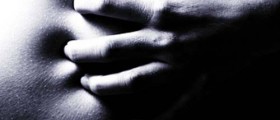Has anyone experienced this - because I am freaking out!!!!
Initially I had noted a sensation like a baby was kicking me in the R side. This was very subtle and I would just kind of push it back in or move around and it would stop. Then I developed severe constipation. I have a history of constipation, but nothing like this. I tried everything under the sun to have a bowel movement. Didn't happen. Tried Metamucil and it helped me to go but not as much as I thought I should have and it was very "strange" looking stool. Then came mid-R sided pain. The same area where the "baby kicking sensation" was at. I had bouts of severe gas that could be released intermittently during this time. But now it's like its blocked from coming out. and now it feels like my intestines are being squeezed to death to the point they are painful. It will squeeze then slowly release. this has been going on pretty much every day for the last 4 months. Some days better than others, but always there. and then there's the bloating that started before any other sympotms also. The strange thing is when I first get up there's no bloating it just increases through the day. Also no symptoms when I first get up in morning. Worsens thru day. Went to ER had negative CT scan w/IV contrast and oral contrast and all lab work (liver, pancreas, WBCs, etc) normal. Slight elevation in neutrophils which can be caused by infection or anxiety. Help!!! anybody?? Have you experienced this? I have colonoscopy this Monday. On clear liquids starting today. Still have this weird sensation in the abomen as if my intestines are moving all over. I can actually feel them moving in there.
Loading...
Loading...
Hello.
Your symptoms, including the sensation of movement in your abdomen, severe constipation, changes in stool appearance, mid-right sided pain, gas, bloating, and the pattern of symptoms worsening throughout the day, are all significant and warrant thorough medical evaluation. It's good to hear that you've already had some tests, including a CT scan and blood work, and that you have a colonoscopy scheduled. Here are a few points to consider:
-
Importance of the Colonoscopy: The colonoscopy is a crucial step in diagnosing potential issues in the colon, such as inflammatory bowel diseases (like Crohn's disease or ulcerative colitis), polyps, or other abnormalities. It can provide valuable information that imaging and blood tests might not reveal.
-
Possible Conditions: Your symptoms could be indicative of various gastrointestinal conditions. These might include irritable bowel syndrome (IBS), partial bowel obstruction, diverticulitis, or less commonly, conditions like intestinal motility disorders.
-
Diet and Lifestyle Factors: While you're waiting for your colonoscopy, consider keeping a food diary to track what you eat and how it correlates with your symptoms. Sometimes, certain foods can exacerbate gastrointestinal issues.
-
Managing Symptoms: For managing symptoms like gas and bloating, dietary adjustments can sometimes be helpful. Avoiding foods known to cause gas (like beans, certain vegetables, and carbonated drinks) might provide some relief. However, since you're on a clear liquid diet in preparation for your colonoscopy, follow those instructions strictly.
-
Mind the Timing of Symptoms: The fact that your symptoms worsen as the day progresses could be related to food intake and physical activity. This pattern might provide clues to your healthcare provider about the nature of your condition.
-
Seek Medical Attention if Symptoms Worsen: If your symptoms significantly worsen or you experience new symptoms like severe pain, fever, or vomiting, seek immediate medical attention.
-
Post-Colonoscopy Follow-Up: After your colonoscopy, it’s important to have a thorough discussion with your gastroenterologist about the findings and the next steps. They might recommend further tests, dietary changes, medications, or other treatments based on the results.
Good luck!
Loading...















